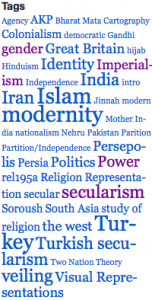Pedagogy is a major facet of any faculty job, and it is a source of conversation–and pride–at 481 Main Street. Religion faculty have been nominated for and won teaching awards, regularly attend pedagogical workshops, run innovative programming linking research and teaching as well as classrooms and internships. We often exchange notes on best practices, ideas that worked (and flopped!), and our students’ best work. We thought we’d kick off a series in which we shared these Notes from our Classrooms.
Last semester, Prof. Vicki Brennan taught student-favorite REL103: Sacred Sounds. While many enroll thinking it is a class about sacred music, Prof. Brennan dissuades them of that on day one–this is a course committed to thinking through theories of sound, how sound becomes labeled “religious,” and how those religious sounds enter and shape public and private spaces.
 Prof. Brennan asked her Sacred Sound students to craft the Burlington Soundscape Project. This digital humanities project is an impressive collection of student work that physically and aurally mapped the sounds of Burlington. Students collected sounds (listen here) and then analyzed those sounds in the theoretical and practical terms of sound (e.g., “noise” and legal noise ordinances), the study of religion, and concepts of mapping.
Prof. Brennan asked her Sacred Sound students to craft the Burlington Soundscape Project. This digital humanities project is an impressive collection of student work that physically and aurally mapped the sounds of Burlington. Students collected sounds (listen here) and then analyzed those sounds in the theoretical and practical terms of sound (e.g., “noise” and legal noise ordinances), the study of religion, and concepts of mapping.
In REL195: Islam & Modernity, Prof. Ilyse Morgenstein Fuerst had students research specific geographic areas (Iran, South Asia, and Turkey) alongside concepts of modernity. Instead of producing research papers, students were asked to distill their theoretically-driven and detail-heavy work into short blog posts, meant for public readership. Prof. Morgenstein Fuerst has used blogging before in other courses, and in light of overwhelmingly positive student responses to it, repeated the assignment in this brand-new course. Students wrote about trends in modernity and Islam with respect to gender, imperialism, power, secularism, and what it’s like to learn and unlearn, among other topics. See the full blog here.
As the Spring 2016 hits its stride, we’ll have more Notes from our Classrooms to share!

